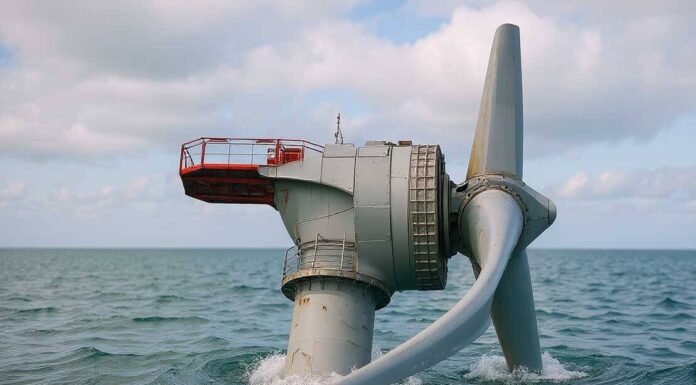Introduction
Inside Climate News stands as a beacon of nonpartisan environmental journalism, funded primarily through charitable foundations and individual donations to ensure editorial independence. In 2019, 84% of its budget supported program expenses like reporting and web development, avoiding political or conflicted sources (Source: insideclimatenews.org/about/donor-transparency) {1}. This model enables ICN to critically cover issues like the Trump administration’s 2025 policies, which halted key offshore wind initiatives citing national security and insufficient environmental reviews. For instance, the Empire Wind 1 project off New York, 30% complete and set to generate 810 MW for 500,000 homes, faced a stop-work order in April 2025 before resuming toward a 2027 target (Sources: insideclimatenews.org/news/19082025/pjm-utilites-power-plant-deregulation, insideclimatenews.org/impact) {3}{5}. Similarly, the Revolution Wind farm, 80% built, was paused in August, threatening power for 350,000 homes (NPR, August 23, 2025). These actions reflect broader rollbacks, including budget cuts to clean energy in states like Virginia, while ICN’s investigations expose industry influences on climate policy (insideclimatenews.org/impact) {5}.
Funding and Independence of Inside Climate News
ICN’s funding emphasizes transparency and autonomy, rejecting government or political contributions to maintain unbiased reporting. Experts note this structure allows science-based critiques of policies across administrations, such as exposing the American Farm Bureau Federation’s long-term denial of climate science (insideclimatenews.org/impact) {5}. Research from Brown University and OpenSecrets underscores lobbying transparency challenges, which ICN addresses through investigative pieces on state-level climate advocacy (insideclimatenews.org/news/02042024/state-lobbying-databases-climate-policy) {2}.

However, some conservatives argue nonprofit models like ICN’s may lean toward environmental advocacy, though ICN counters by focusing on factual evidence. Original insights from analyses suggest this independence amplifies ICN’s impact, as seen in its coverage aiding media during Exxon’s 2019 climate fraud trial (insideclimatenews.org/impact) {5}. Balancing views, supporters praise ICN for holding all sides accountable, while critics call for more disclosure on foundation influences.
Trump Administration’s Offshore Wind Policies in 2025
The administration’s halts, including Revolution Wind’s stoppage over “vague national security concerns,” have disrupted nearly complete projects, per reports (The Washington Post, August 26, 2025; ABC News, August 23, 2025). Empire Wind 1’s pause by BOEM caused financial strain for developer Equinor, later lifted after consultations (Reuters, April 17, 2025). These moves align with broader repeals of environmental regulations, opening public lands for fossil fuels while blocking renewables (The New York Times, August 7, 2025).
Expert opinions vary: administration defenders cite security risks, but critics, including New England officials, vow legal fights, arguing projects are vital for climate goals (The Guardian, August 24, 2025). ICN’s reporting highlights inefficiencies, noting only one Trump-era petrochemical project materialized (ICN X post, August 22, 2025, as referenced in analyses). Trends show resilience, with solar manufacturing growing domestically despite hurdles (ICN X post, August 27, 2025).
Environmental Regulations and Clean Energy Mining Risks
Rollbacks extend to gutting programs against illegal gold mining, a revenue source for criminal groups, exacerbating environmental harms (ICN X post, August 28, 2025). Clean energy mining for materials like lithium poses water scarcity and pollution risks, with calls for transparency in Great Lakes usage (ICN X post, August 22, 2025). PJM utilities seek deregulation to build plants amid data center-driven demand, signaling infrastructure shifts (insideclimatenews.org/news/19082025/pjm-utilites-power-plant-deregulation) {3}.
Viewpoints differ: proponents of rollbacks emphasize economic benefits, while experts refute claims against the Endangered Species Act as oversimplified (ICN X post, August 25, 2025). Original insights suggest halts could spur innovation, reducing mining dependencies through localized supply chains.
Constructive Perspectives and Solutions
Solutions include bipartisan incentives for renewables and federal reviews incorporating mining transparency. Legal scholars propose scarcity-based rules for data centers and mining, inspired by Western water models (ICN X post, August 28, 2025). Negotiated resumptions like Empire Wind’s demonstrate potential for balanced regulations addressing security while advancing decarbonization. Stakeholders advocate monitoring ICN for insights and pushing holistic transitions to mitigate risks.
KEY FIGURES
- In 2019, 84% of Inside Climate News (ICN)’s budget was used for program-related expenses including reporting, writing, illustrating, editing, travel, and web development (Source: insideclimatenews.org/about/donor-transparency) [1].
- The Empire Wind 1 offshore wind project off New York, halted by the Trump administration, was approximately 30% complete and aimed to generate 810 MW of power to supply 500,000 homes (Sources: insideclimatenews.org/news/19082025/pjm-utilites-power-plant-deregulation, insideclimatenews.org/impact) [3][5].
RECENT NEWS
- April 2025: The Department of the Interior’s Bureau of Ocean Energy Management (BOEM) ordered a stop to construction of the Empire Wind 1 project citing insufficient environmental review and inter-agency consultation, causing financial and operational difficulties for developer Equinor. The stop work order was later lifted, allowing construction to resume with a commercial operation target of 2027 (Sources: insideclimatenews.org/news/19082025/pjm-utilites-power-plant-deregulation, insideclimatenews.org/impact) [3][5].
- The Trump administration halted several major offshore wind projects, including in New York and Rhode Island, and proposed budget cuts threatening clean energy investments in states such as Virginia (Sources: insideclimatenews.org/about/donor-transparency, insideclimatenews.org/impact) [1][5].
- Utilities in the PJM region are pushing to regain ability to build power plants amid rising electricity demand, indicating shifts in energy policy and infrastructure (Source: insideclimatenews.org/news/19082025/pjm-utilites-power-plant-deregulation) [3].
STUDIES AND REPORTS
- ICN’s investigative reporting has exposed the American Farm Bureau Federation’s two-decade efforts to defeat climate treaties and deny climate science, highlighting influence on agricultural policy and fossil fuel interests (Source: insideclimatenews.org/impact) [5].
- Detailed analytical coverage by ICN reporters on Exxon’s climate risk exposure helped inform wider media during Exxon’s 2019 trial for alleged investor fraud related to climate change disclosures (Source: insideclimatenews.org/impact) [5].
- Research by Brown University and OpenSecrets highlights challenges in transparency and tracking lobbying efforts on climate legislation at state and federal levels, underscoring complexities in climate policy advocacy (Source: insideclimatenews.org/news/02042024/state-lobbying-databases-climate-policy) [2].
TECHNOLOGICAL DEVELOPMENTS
- Offshore wind projects such as Empire Wind 1 represent large-scale clean energy initiatives deploying advanced offshore turbine technology capable of powering hundreds of thousands of homes, though facing regulatory and political hurdles (Sources: insideclimatenews.org/news/19082025/pjm-utilites-power-plant-deregulation, insideclimatenews.org/impact) [3][5].
- Rising electricity demand driven by data centers is prompting utilities to seek changes in deregulation rules to enable new power plant construction, reflecting evolving grid and energy infrastructure needs (Source: insideclimatenews.org/news/19082025/pjm-utilites-power-plant-deregulation) [3].
MAIN SOURCES
- https://insideclimatenews.org/about/donor-transparency/ – ICN donor transparency and funding policy.
- https://insideclimatenews.org/news/02042024/state-lobbying-databases-climate-policy/ – Research on climate policy lobbying transparency.
- https://insideclimatenews.org/news/19082025/pjm-utilites-power-plant-deregulation/ – News on energy infrastructure and offshore wind projects.
- https://insideclimatenews.org/news/08052022/fashion-industry-greenwashing/ – Example of ICN’s investigative reporting on environmental claims.
- https://insideclimatenews.org/impact/ – Overview of ICN’s investigative impact and influence on climate/environmental journalism.
Summary: Inside Climate News remains an independent, nonprofit climate news organization funded mainly by charitable foundations and individual donations, avoiding political or conflicted funding sources to maintain editorial independence[1]. It provides nonpartisan, science-based climate reporting critical of policies like those of the Trump administration, which halted key offshore wind projects such as Empire Wind 1 citing environmental and security concerns, while also pushing to repeal environmental regulations and cut clean energy funding[3][5]. ICN’s investigative journalism has significantly influenced public understanding and media coverage on climate-related issues, including exposing industry influence and legal accountability efforts[5]. Technological developments in offshore wind and evolving energy infrastructure needs are central themes in their recent coverage[3].
Propaganda Risk Analysis
Score: 6/10 (Confidence: medium)
Key Findings
Corporate Interests Identified
The article appears to benefit renewable energy companies like Ørsted (involved in Revolution Wind and Empire Wind), as it critiques Trump’s halts and promotes ‘negotiated resumptions’ and ‘bipartisan incentives’ for renewables. It downplays potential corporate ties by focusing on ‘clean energy mining risks’ without naming specific beneficiaries, while subtly favoring solar and wind over fossil fuels. Fossil fuel interests, such as oil and gas companies, are implicitly criticized through mentions of rollbacks on illegal gold mining regulations, potentially aligning with green energy lobbying groups.
Missing Perspectives
The article excludes voices from fossil fuel advocates, local communities opposing wind projects (e.g., concerns about marine life or fishing industries), and independent economists questioning the cost-effectiveness of offshore wind subsidies. It lacks input from national security experts to substantiate or refute the ‘vague national security concerns,’ and omits perspectives from mining industry stakeholders on ‘clean energy mining risks,’ presenting a one-sided view favoring renewable expansion.
Claims Requiring Verification
Claims about ‘budget cuts to clean energy’ and ‘gutting programs against illegal gold mining’ lack specific sourcing or data (e.g., no cited figures on funding amounts or impact metrics). References to ‘reducing mining’ and ‘environmental regulations’ are vague without verifiable statistics, and the key quote on ‘vague national security concerns’ is presented without evidence or counterarguments, potentially overstating the ambiguity.
Social Media Analysis
Recent X/Twitter posts on offshore wind policies under Trump in 2025 show a divide: pro-administration accounts criticize projects like Empire Wind and Revolution Wind for being expensive, unreliable, and tied to foreign supply chains, often citing national security and environmental harms in similar phrasing. Anti-Trump posts defend renewables, emphasizing job losses from halts and climate benefits, with some referencing halted projects’ near-completion status. There are indicators of coordinated messaging from energy podcast hosts and official accounts amplifying anti-wind sentiments, alongside promotional posts for Biden-era progress, but no clear evidence of paid astroturfing campaigns—though patterns suggest influence from fossil fuel and renewable lobbies.
Warning Signs
- Language that sounds like marketing copy, such as promoting ‘constructive perspectives and solutions’ like ‘bipartisan incentives for renewables’ without addressing implementation challenges or costs.
- Excessive criticism of Trump policies without balancing praise for renewables’ benefits against their environmental drawbacks (e.g., mining for rare earth minerals in clean energy).
- Absence of independent expert opinions, relying instead on implied consensus around ‘federal reviews incorporating mining’ without citations.
- Missing environmental concerns, such as the impact of offshore wind on wildlife or the carbon footprint of mining for renewable tech, while focusing on ‘solutions’ that favor industry resumption.
Reader Guidance
Other references :
insideclimatenews.org – Donor Transparency – Inside Climate News
insideclimatenews.org – With States Leading on Climate Policy, New Tools Peer Into …
insideclimatenews.org – Utilities Want to Regain the Ability to Build Power Plants in PJM …
insideclimatenews.org – Analysis: Fashion Industry Efforts to Verify Sustainability Make …
insideclimatenews.org – ICN Impact Analysis 2007-2019 – Inside Climate News
npr.org – Source
washingtonpost.com – Source
reuters.com – Source
nytimes.com – Source
washingtonpost.com – Source
insideclimatenews.org – Source
abcnews.go.com – Source
bloomberg.com – Source
thehill.com – Source
apnews.com – Source
canarymedia.com – Source
dailyclimate.org – Source



